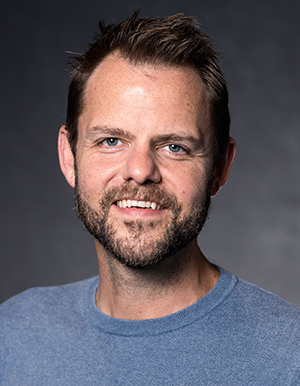
Justin Burton, Associate Professor and Winship Distinguished Research Professor, Emory University
"Electrified matter at the mesoscale: from windblown dust to jumping parasites"
Abstract:
Electrostatic forces play an active role in shaping our environment. Charge separation occurs naturally when there is flow and friction, such as water droplets in storm clouds or the movement of animals and insects. On Earth, water plays a crucial role in electrified mesoscale matter. This talk will showcase a number of studies in our lab, from dust particles to liquid drops, and even the role of electrostatics in nematode infection. First, we experimentally investigated the lifetime of charge on acoustically levitated, millimetric particles. The particles were charged up and suspended for weeks, while their charge was measured through non-contact methods. In dry conditions, the charge decayed over several days, and we show how this can be important for the transport of unexpectedly large particles in the atmosphere. Second, we measured the charge on liquid drops during deposition, a process common in nearly every laboratory. For water in contact with metal, the charge is mostly determined by electrochemical potentials, yet introducing plastic components led to a tremendous increase in charging effects. Third, we investigated how charge can facilitate host attachment in jumping, parasitic nematodes. These worms jump when the vibrations of a nearby insect (fly) are detected, and often the insects are charged. In experiments, we inferred the charge on different worms by fitting their trajectories to a hydrodynamic model with drag, gravity, and electrostatic forces, and found that the charge can be estimated using a simple model of electrostatic induction. Lastly, I will touch on related, ongoing projects in our lab investigating how electrostatic forces shape our environment.
Bio:
Justin Burton received his B.S. in Physics from the University of Cincinnati in 2001, followed by a Ph.D. in Physics from the University of California, Irvine in 2006. He then completed postdoctoral research at the Fred Hutchinson Cancer Research Center and the University of Chicago before joining Emory University’s Department of Physics in 2013, where he is currently a Professor of Physics. His honors include selection as a Gordon and Betty Moore Experimental Physics Investigator, election as a Fellow of the American Physical Society, and an NSF CAREER Award. Burton’s experimental, interdisciplinary lab explores a broad spectrum of complex and nonequilibrium phenomena, with ongoing projects on interfacial and nanoscale fluid dynamics, machine learning approaches to many body dusty plasma dynamics, and “soft earth” geophysics. Beyond research, he leads several K 12 STEM outreach and education initiatives throughout the Atlanta region.